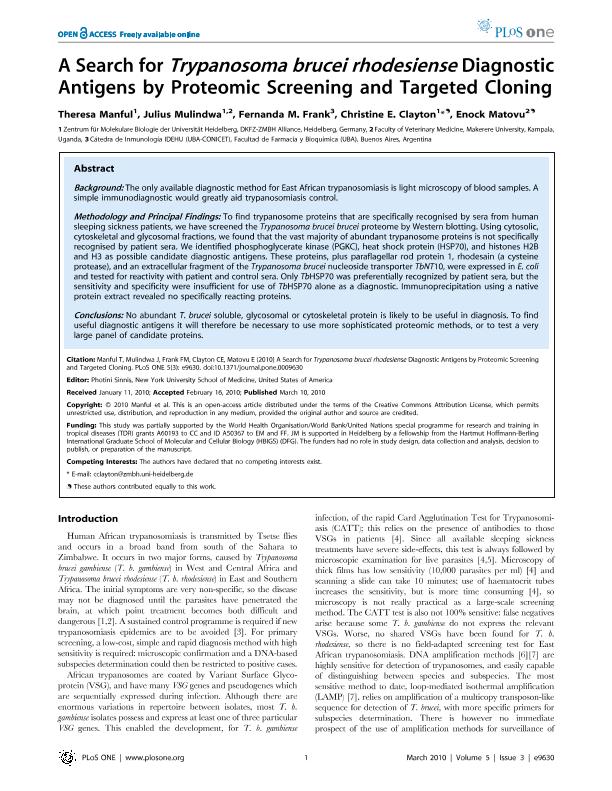Artículo
A search for Trypanosoma brucei rhodesiense diagnostic antigens by proteomic screening and targeted cloning
Fecha de publicación:
03/2010
Editorial:
Public Library of Science
Revista:
Plos One
ISSN:
1932-6203
Idioma:
Inglés
Tipo de recurso:
Artículo publicado
Clasificación temática:
Resumen
Background: The only available diagnostic method for East African trypanosomiasis is light microscopy of blood samples. A simple immunodiagnostic would greatly aid trypanosomiasis control. Methodology and Principal Findings: To find trypanosome proteins that are specifically recognised by sera from human sleeping sickness patients, we have screened the Trypanosoma brucei brucei proteome by Western blotting. Using cytosolic, cytoskeletal and glycosomal fractions, we found that the vast majority of abundant trypanosome proteins is not specifically recognised by patient sera. We identified phosphoglycerate kinase (PGKC), heat shock protein (HSP70), and histones H2B and H3 as possible candidate diagnostic antigens. These proteins, plus paraflagellar rod protein 1, rhodesain (a cysteine protease), and an extracellular fragment of the Trypanosoma brucei nucleoside transporter TbNT10, were expressed in E. coli and tested for reactivity with patient and control sera. Only TbHSP70 was preferentially recognized by patient sera, but the sensitivity and specificity were insufficient for use of TbHSP70 alone as a diagnostic. Immunoprecipitation using a native protein extract revealed no specifically reacting proteins. Conclusions: No abundant T. brucei soluble, glycosomal or cytoskeletal protein is likely to be useful in diagnosis. To find useful diagnostic antigens it will therefore be necessary to use more sophisticated proteomic methods, or to test a very large panel of candidate proteins.
Palabras clave:
Trypanosoma Brucei Rhodesiense
,
Diagnosis
Archivos asociados
Licencia
Identificadores
Colecciones
Articulos(IDEHU)
Articulos de INST.DE EST.DE LA INMUNIDAD HUMORAL PROF.R.A.MARGNI
Articulos de INST.DE EST.DE LA INMUNIDAD HUMORAL PROF.R.A.MARGNI
Citación
Manful, Theresa; Mulindwa, Julius; Frank, Fernanda Maria; Clayton, Christine E.; Matovu, Enock; A search for Trypanosoma brucei rhodesiense diagnostic antigens by proteomic screening and targeted cloning; Public Library of Science; Plos One; 5; e963; 3-2010; 1-7
Compartir
Altmétricas




